Steve Murrell's Blog, page 33
March 25, 2021
Called by God
A few weeks ago, I was reading Genesis during my morning devotions and immediately paused at Genesis 12:1–4. As I read about Abram and the call of God on his life, I saw a lot of applications for the call to vocational ministry.
Here are three descriptions of the call of God from the life of Abram in Genesis 12:
From and toCall and responseLocal to globalWhen you think about God’s call on your life, remember that we don’t ultimately make the plans. God initiates the call, and we respond to it. God picks the places and the people. Our job is to obey. Responding to the call is the opposite of asking him to bless our vision or giving him a part of our plan.
I pray that each of us walk closely with God and listen intently as He directs our lives.
March 18, 2021
Cultivating Healthy Culture
We all know that culture matters, but we also know that cultivating a healthy culture is really difficult. Many of us have been on teams with healthy cultures, and we’ve also been on teams with unhealthy cultures. It’s easy to know the difference when you are in it, but it’s much harder to know how to change it for the better. In this short video, I look at three keys to cultivating a healthy culture in our churches and on our teams:
Obsessive focusUnapologetic repetitionIntentional staffingHowever, the crucial context for these three keys is community. Like the Cedars of Lebanon referred to in the Bible, great leaders grow together. When we cultivate healthy team cultures, we are creating an environment for leaders (plural) to flourish and be fruitful.
March 3, 2021
Young Donkeys and Campus Ministry
In Every Nation, we talk a lot about the campus. It’s in our mission statement, and it’s a significant part of decisions on where to plant next. Why? Because reaching the next generation is a crucial part of our calling. We have always said that we have one foot on the campus and one foot in the community.
This focus on the campus is not merely a strategy or preference. It’s a calling.
February 17, 2021
As the Church Regathers
As our cities and nations begin to reopen, especially now that COVID-19 vaccines are becoming available, I know that we all look forward to regathering with our churches soon. While we prepare to come together, let’s remember why we gather:
To worship God.To hear a word from God.After 2020, my prayer is that you and your church would have a deeper appreciation for worshiping together and a greater hunger for God.
February 4, 2021
Visionary Leadership
All humans are divinely designed to pursue a vision. Though God’s original intent was for mankind to pursue his mission on the earth, many well-meaning Christians settle for lesser visions: consumerism, political ideologies, conspiracy theories, and more.
It’s true that these things can catch our attention. They offer a vision that captures the mind, moves the affection, and demands sacrificial action.
But now, more than ever, the people we lead need a vision that is bigger and more important than their fears and circumstances. It is the leader’s job to cast that vision.
Today, we’re going to look at Habakkuk 1:1–4 and talk about casting a vision that helps people see beyond the personal and the local.
January 27, 2021
The Power and Danger of Listening
One of the most troubling trends of 2020 has been the loss of truth in the public sphere. Many people are losing trust in conventional sources of truth (the media, the government, even the church) and turning to a rapidly fragmenting cacophony of voices on social media and the web.
As a leader, it can be discouraging to know that the people you are leading have so many voices vying for their attention and very often telling them half-truths or outright lies. We know that there is power and danger in listening to the wrong voices.
How can we disciple people well so that they are not deceived by conspiracy theories and led astray? What does discipleship have to do with rejecting lies and embracing the truth?
Everything.
In this sermon (which I preached in Nashville on January 10), I look at Luke 9, which contains Jesus’ clearest definition of discipleship (9:23) followed by the clearest manifestation of his divinity on the Mount of Transfiguration (9:29). On the mountain, a voice from heaven makes a declaration that we need to hear in 2021: “This is my Son, whom I have chosen; listen to him.”
January 20, 2021
Think Strong, Lead Long
I know that 2020 was a very challenging year for many leaders, and many are wondering how they’ll make it through another year of pandemic-related uncertainty and challenges. My charge to all leaders in 2021 is to think like a tortoise.
The tortoise is never in a hurry because they take the long view on life (and they live very long lives—like 100 years!).
One leader in the Bible who thought like a tortoise was Abraham. He took the long view on God’s promises and held on to God’s word for a son well into old age. In this video, I address a group of Malaysian pastors and encourage them to keep three truths in mind:
God always works according to His word.God always keeps His promises.God is never late.May God give you the grace to run your race like a tortoise.
January 8, 2021
America: A City on a Hill?
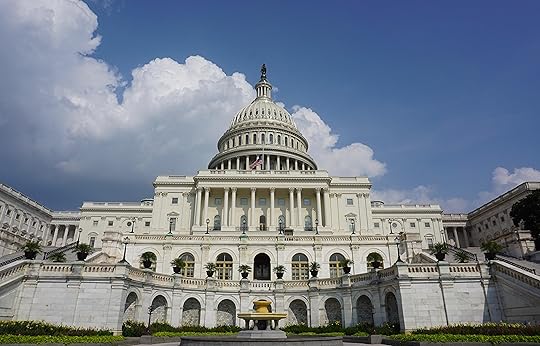
As the cofounder and president of a global family of churches and campus ministries, I try to avoid commenting on local or national events. That is the role of local church pastors and regional team leaders. However, the violent and tragic events that transpired in the United States Capitol on January 6th have shaken not only Americans but people around the world, and I would like to offer a global, theological, and missional perspective to leaders who are trying to make sense of what happened two days ago.
Unprecedented?: A Global Perspective
As I watched in stunned silence live footage of thousands of rioters breaking down metal barriers and storming the United States Capitol building, I heard words like “unprecedented” and “unimaginable” over and over again from news anchors and on social media.
For many Americans, these events did seem unprecedented and unimaginable; but for others watching around the world, these events echoed the horrors they have experienced in their nations in very recent memory. For example, in just the last eighteen months, protesters have breached and occupied legislative and government buildings in Hong Kong (July 2019), Serbia (July 2020), Kyrgyzstan (October 2020), and Armenia (November 2020). Even if we look back into America’s history, we find many more instances of civil unrest and political violence—and even breaches of the Capitol building (as recently as 1954).
These events should be a sobering reminder of the historical reality that all human governments will come to an end—even the American experiment, with all its brilliant successes (and tragic failures) over the past two centuries.
A City on a Hill?: A Theological Perspective
More importantly, these recent events should be a hopeful reminder of the theological reality that, contrary to what American presidents often claim in their speeches, America is not the “city on a hill.” The Church is.
When Jesus spoke these famous words in Matthew 5:14— “You are the light of the world. A city set on a hill cannot be hidden”—He was talking to His disciples and by extension the people from every tribe, tongue, and nation who would follow Him after His resurrection. Whenever we confuse the Kingdom of God with earthly kingdoms, we not only set ourselves up for disappointment but we have unintentionally set up an idol.
While I am deeply saddened that America has reached this low point, I am hopeful that some American Christians will see their idolatry of the nation and its political messiahs and will remember that we are citizens of an “everlasting Kingdom” (Daniel 4:3). And, as a result, our ultimate allegiance belongs not to Caesar or any other political leader but to King Jesus alone. I am also hopeful that nations around the world who see America in some way as a promised land will realize that America is often more like Babylon than the New Jerusalem.
Light of the World: A Missional Perspective
As an American, I am praying that the tragic events that happened in Washington D.C. a few days ago will be a wake-up call for politicians of both parties and will result in political renewal and a depolarization of American politics and society.
But as a global Christian, my prayer is even more ambitious and more hopeful. I am praying that in these dark times—not only in America but around the world—Christians will remember we are the “light of the world;” we are the “city set on a hill;” we are “the salt of the earth.”
The mission hasn’t changed.
We’ve just been reminded that it’s our job—not America’s.
January 7, 2021
Consecrate Yourself
As we have for many years, next week, Every Nation people around the world are joining together for a week of prayer, fasting, and consecration. As we prepare for this week together, I’d like to look at Joshua 3 and make three observations about Israel’s call to fast.
December 16, 2020
My Top 10 Books of 2020

Three times in the past week, different leaders from around the world have asked me to recommend books on various topics pertaining to leadership. I took that as a gentle reminder that it is time to post my annual top ten book list.
As you peruse my list, may the words of my favorite doctor inspire you to read more in 2021 than in all previous years. Because, “The more that you read, the more things you will know. The more that you learn, the more places you’ll go.” —Dr. Seuss
Here’s my list for 2020.

1. You Are What You Love: The Spiritual Power of Habit by James K. A. Smith
If you only read one book from this list, read this book. If you only read one book in 2021, read this book. If you have read all of Smith’s books, including this book, read this book (again).
Summary quote: “What if, instead of starting from the assumption that human beings are thinking things, we started from the conviction that human beings are first and foremost lovers? What if you are defined not by what you know but by what you desire? What if the center and seat of the human person is found not in the heady regions of the intellect but in the gut-level regions of the heart? How would that change our approach to discipleship and Christian formation?”
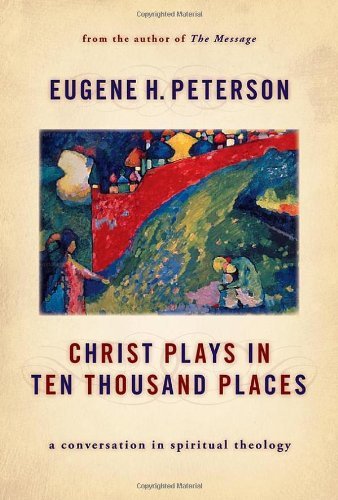
2. Christ Plays in Ten Thousand Places: A Conversation in Spiritual Theology by Eugene Peterson
This book was a Christmas gift from a friend. I recommend reading it slowly so you don’t miss anything. I started this one in January and finished in August, reading a page or two or ten each morning before reading my Bible.
Overview (from B&N): “Lamenting the vacuous, often pagan nature of contemporary American spirituality, Eugene Peterson here firmly grounds spirituality once more in Trinitarian theology and offers a clear, practical statement of what it means to actually live out the Christian life.”
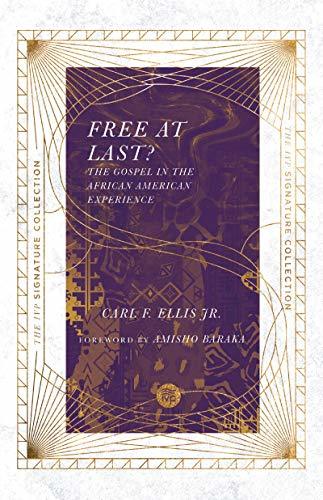
3. Free at Last?: The Gospel in the African American Experience by Carl F. Ellis Jr.
Ellis started his ministry in 1969 as a campus missionary with Tom Skinner. He currently serves as professor of theology and culture at Reformed Theological Seminary and as senior fellow at the African American Leadership Initiative.
From the foreword: “There are well-natured Black practitioners who were baptized into a one-sided orientation of White evangelicalism that was void of a biblical view in social justice. However, some Black practitioners who were educated in liberal institutions have a high regard for addressing systemic injustice but a low regard for biblical authority. Praise God for Carl Ellis Jr. and the courage to speak grace and truth no matter the subject. This book lifts up a gospel that not only renews hearts but also renews institutions.”
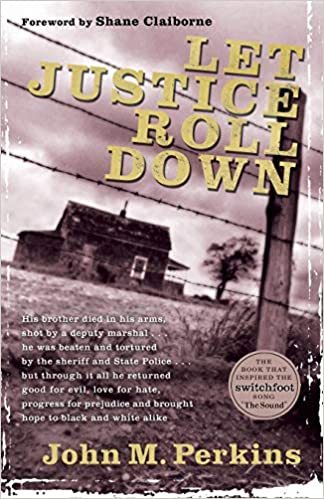
4. Let Justice Roll Down by John M. Perkins
Born into poverty in segregated rural Mississippi ninety years ago, Perkins is a church planter, pastor, preacher, civil rights leader, entrepreneur, reconciler, bridge builder, and peacemaker. He is the recipient of sixteen honorary doctorates and the author of fifteen books. If you are not familiar with this living legend, this book is the place to start. After reading Let Justice Roll Down, you’ll want to read the other fourteen.
From the book jacket: “His brother died in his arms, shot by a deputy marshal. He was beaten and tortured by the sheriff and State Police, but through it all he returned good for evil, love for hate, progress for prejudice and brought hope to black and white alike.”
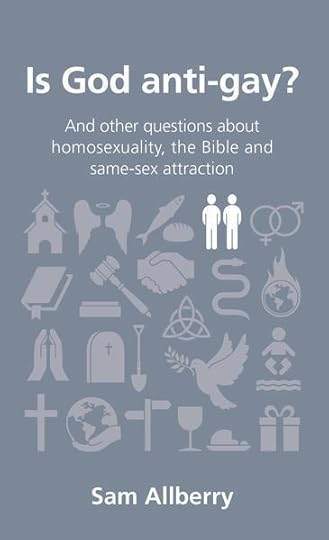
5. Is God Anti-Gay? And Other Questions about Homosexuality, the Bible and Same-Sex Attraction by Sam Allberry
I had the privilege of discussing this book with Sam over breakfast in Nashville before COVID. I learned much. Like a conversation with Sam in person, his book is clear, biblical, and gracious, with classic British “humour” popping up at just the right moment.
Quote: “When someone says they’re gay, or for that matter, lesbian or bisexual, they normally mean that, as well as being attracted to someone of the same gender, their sexual preference is one of the fundamental ways in which they see themselves. And it’s for this reason that I tend to avoid using the term. It sounds clunky to describe myself as ‘someone who experiences same-sex attraction.’ But describing myself like this is a way for me to recognize that the kind of sexual attractions I experience are not fundamental to my identity. They are part of what I feel but are not who I am in a fundamental sense. I am far more than my sexuality.”

6. A Bible and a Passport: Obeying God’s Call to Make Disciples in Every Nation by Jun Escosar
Jun is one of the first Filipinos I met in 1984 when a bunch of clueless Americans attempted to plant a church in Manila’s University-Belt. A year later, Jun was the first full-time staff member of Victory Manila. From then until now, Jun has served in almost every ministry role possible: worship leader, campus missionary, church planter, pastor, teacher, evangelist, mission strategist, and others. Jun earned a doctor of missiology degree from the Asia Graduate School of Theology, and beginning in January 2021, he will serve as the first president and professor of missiology at Every Nation Seminary. I can think of no one better to write a book about the global vision and mission history of Every Nation Churches & Ministries. This is a read-straight-through book.
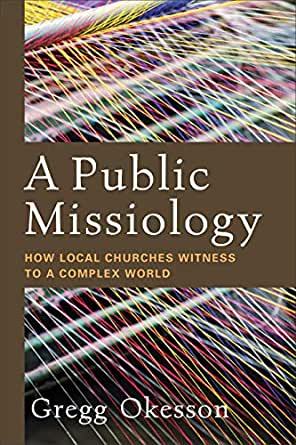
7. A Public Missiology: How Local Churches Witness to a Complex World by Gregg Okesson
Gregg was one of the Asbury Seminary professors responsible for talking me (and other Every Nation leaders) into returning to seminary, and I am forever grateful. The classes Gregg taught went by way too fast. All his students sat there silently pleading for him to keep on teaching. Forget about lunch. Forget about bathroom breaks. Just keep talking. His lectures were that engaging. So is his book. Gregg is a great teacher and a better man.
Book quote: “We moved to Tanzania to plant churches, but I quickly realized one could not do evangelism, nor discipleship, nor ecclesiology of any kind, without taking seriously the public realities surrounding the people . . . How does church planting relate to poverty, or evangelism to health, or religion to development? I did not have good answers to those queries, but the questions lingered with me and resulted in this book.”
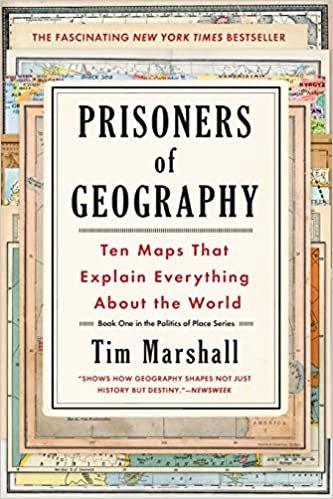
8. Prisoners of Geography: Ten Maps That Explain Everything about the World by Tim Marshall
Although this book is not written from a religious perspective, anyone passionate about maps or global mission will enjoy and learn much from Marshall’s geography philosophy.
Quotes: “What is now the EU was set up so that France and Germany could hug each other so tightly in a loving embrace that neither would be able to get an arm free with which to punch the other . . . Africa’s coastline? Great beaches—really, really lovely beaches—but terrible natural harbors. Rivers? Amazing rivers, but most of them are worthless for actually transporting anything, given that every few miles you go over a waterfall. These are just two in a long list of problems that helps explain why Africa isn’t technologically or politically as successful as Western Europe or North America.”
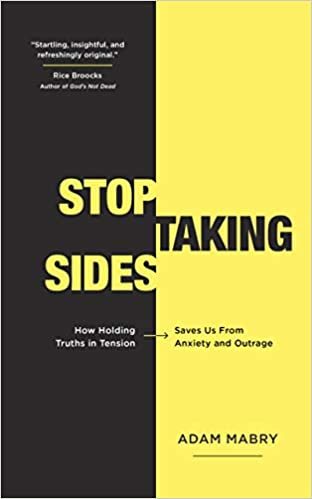
9. Stop Taking Sides: How Holding Truths in Tension Saves Us from Anxiety and Outrage by Adam Mabry
Adam has written another must-read book that can definitely save you from anxiety and outrage.
My official endorsement: “In the age of social media, it has become easier than ever to share opinions (informed or not) without considering how they may affect others. In light of our mandate to make disciples, it is vital that Christians understand how and when to engage one another (and the world) in truthful and gracious conversation. Adam’s book offers significant wisdom and points us back to what really matters. My suggestion: buy this book, read it, and stop taking sides.”
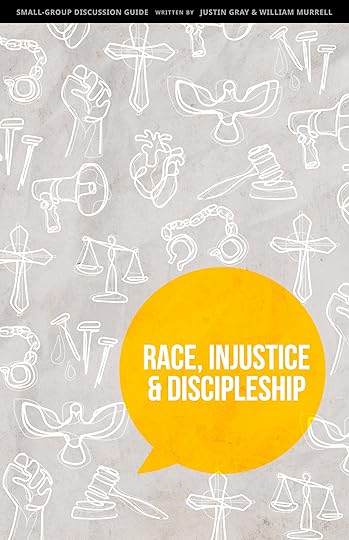
10. Race, Injustice & Discipleship: A Small Group Discussion Guide by Justin Gray and William Murrell
Knowing that Justin (Every Nation Music) and William (Every Nation Seminary) had been co-leading successful discipleship groups that addressed racial reconciliation, in hope of facilitating gospel-centered conversations about racial injustice, I asked them to create a six-week Bible study and devotional guide for our Nashville office to engage in the conversation. Our outcomes included relational trust, genuine repentance, and gospel hope. For a free download, click HERE.
Responding to the unsolicited input about this material, Justin and William are writing a book on the topic that will, hopefully, make next year’s top ten list.
As always, I hope this post inspires you to read a wide variety of authors and topics. And, for some of you, may it inspire you to write. Maybe one day your book will make the list!
Steve Murrell's Blog
- Steve Murrell's profile
- 53 followers



